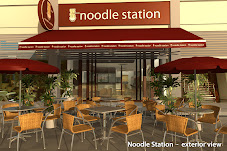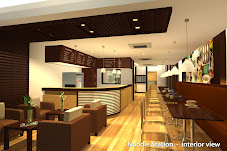Restoran seterusnya di Kota Bharu ialah Restoran Noodle Station yang baru di buka bulan April yang lalu. Restoran ini memperkenalkan satu konsep yang lain daripada yang lain. Lokasi restoran ini berdekatan dengan Pejabat Pos dan Balai Polis Kota Bharu. Sesuai dengan namanya yang melambangkan hidangan menu yang berlainan dari restoran lain serta objektif pengusaha restoran ini yang ingin komersialkan Mee Wantan. Mee Wantan ini dibuat dengan menggunakan seratus peratus telur dan bersifat springy noodle, maksudnya ia tidak mudah putus apabile dimasak. Gandum yang digunakan pula diimpot dari Kanada bagi menghasilkan Wantan yang bermutu tinggi. Selain pelbagai menu mee wantan, Noodle Sttaion juga menyediakan masakan western seperti Grill Lamb Chop, Sirloin Steak dan T-Bone Steak. Haa, pelbagai jenis hidangan dapat anda rasa di restoran ini, apa tunggu lagi..marilah cuba!
Wednesday, November 14, 2007
Noodle Station In Kota Bharu
Posted by
Celoteh Ezri
at
5:49 PM
0
comments
![]()
Labels: Comment And Review
Review By cariso-food.blogspot.com
Sunday, November 11, 2007
Noodle Station @ e-Gate
Noodle Station @ e-Gate. From the menu, it seemed like they termed themselves as the specialist in wan tan mee uh?! :) You could have all different types of ingredients matching to your noodles. Normal dishes' price ranged from RM4.50 to RM5.50. There were a lot of varieties when it comes to drinks. However the ice mocha xxx was rated as 'very bad' by miss L*, the colour looked like very thick ice lemon tea though. :) Ya, they served desserts too.
 Sandwitch, wan tan (additional), fried wan tan noodles with spicy style, seafood wan tan mee.
Sandwitch, wan tan (additional), fried wan tan noodles with spicy style, seafood wan tan mee.
 It was grateful that their wan tan got shrimp.
It was grateful that their wan tan got shrimp. posted by cariso @ 3:55 PM
Posted by
Celoteh Ezri
at
5:44 PM
0
comments
![]()
Labels: Comment And Review
Thursday, November 1, 2007
Deepavali or Diwali is coming - 8th November 2007 (Thursday)
Diwali, (in Hindi - दिवाली or दीपावली), is a major Indian festival that is very significant in Hinduism and Jainism. Known as the "Festival of Lights," it symbolizes the victory of good over evil, and lamps (called diyas or kandils) are lit as a sign of celebration and hope for humankind. The lights also represent the time when Rama came back from the forest, and all his village lit lamps to welcome him back home. Celebrations focus on lights and lamps, particularly traditional dīpa or deeya (earthen lamp, as illustrated). Fireworks are associated with the festival. Diwali is a colloquial name used in North India, while the festival is formally called Deepavali in South India.
Diwali is celebrated for five consecutive days at the end of Hindu month of Kartika (purminata) or Ashwayuja (amanta). It usually occurs in October/November, and is one of the most popular and eagerly awaited festivals in India. Diwali comes exactly twenty days after Dussehra. Hindus, Jains and Sikhs alike regard it as a celebration of life and use the occasion to strengthen family and social relationships. For Hindus it is one of the most important festivals, and beginning of the year in some Hindu calendars. There are several beliefs regarding the origin of the holiday. The most repeated version is that Hindus celebrate Diwali to mark the time when Lord Rama achieved victory over Ravana. Some also view it as the day Krishna defeated the demon Narakasura or in honor of the day Bali went to rule the nether-world, obeying the order of Vishnu. In Jainism it marks the nirvana of Lord Mahavira, which occurred on Oct. 15, 527 BCE. It is also a significant festival for the Sikh faith. In India, Diwali is now considered to be more of a national festival, and the aesthetic aspect of the festival is enjoyed by most Indians regardless of faith.
Posted by
Celoteh Ezri
at
12:12 PM
0
comments
![]()
Labels: History You Need To Know
Dinner In Penang - beingthefreak.blogspot.com
Posted by
Celoteh Ezri
at
7:47 AM
0
comments
![]()
Labels: Comment And Review













